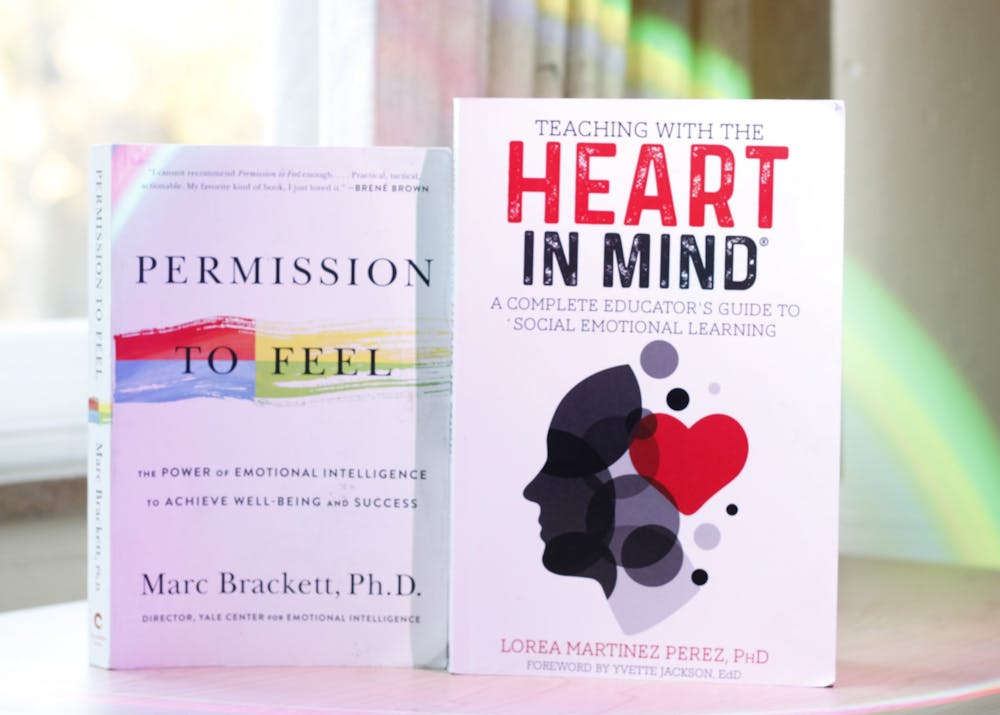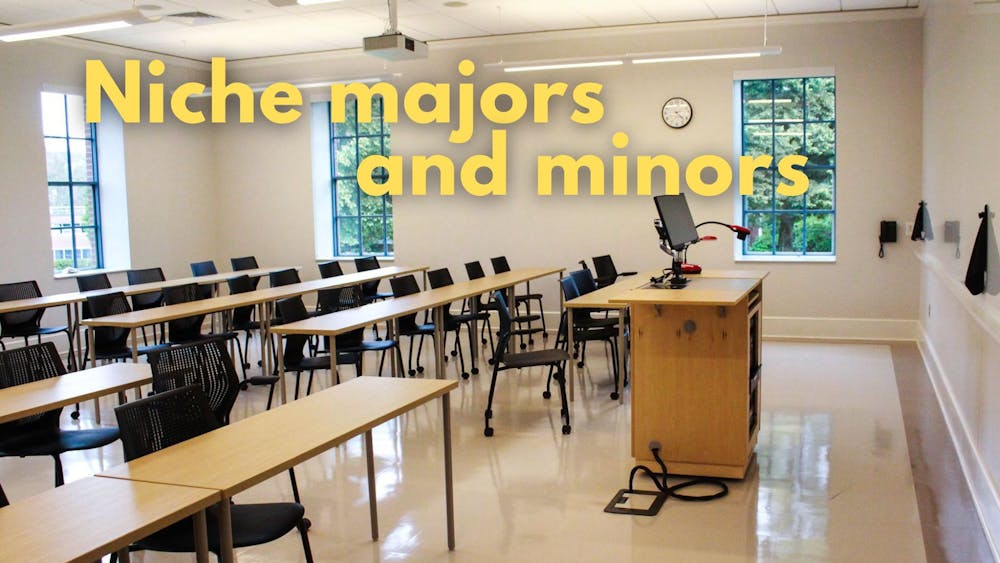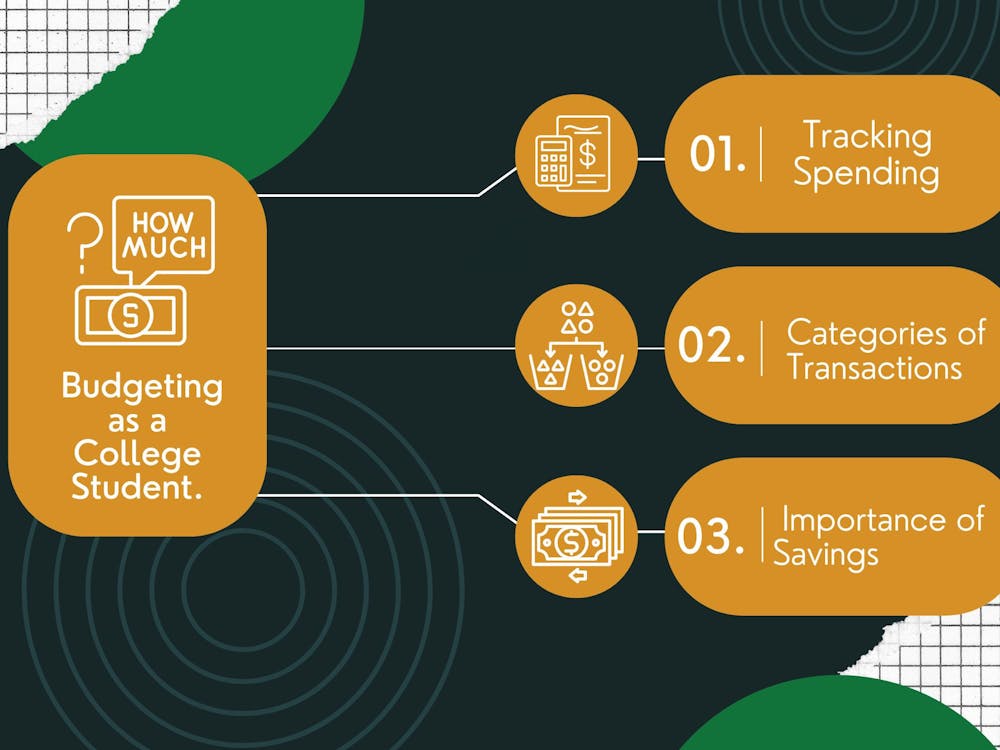When you first come to The Bluff, you’ll meet Pilots studying disciplines like nursing, engineering, marketing and political science. And occasionally, when you ask someone what they're majoring or minoring in, you’ll discover they're studying a field you hadn’t heard of before.
The University is made up of five schools that cover programs ranging from established interdisciplinary fields to those more specific and recently offered at UP.
The Beacon spoke to professors and students studying environmental ethics and policy, organizational communication, supply chain analytics, public health and wellness, Hellenic studies and social and emotional learning to learn more about what these niche majors and minors mean to them.
Environmental ethics and policy
The environmental ethics and policy (EEP) major is part of the environmental studies department and explores environmental justice and politics, according to Department Chair of Environmental Studies and philosophy professor Norah Martin.
Martin’s EEP courses are cross-listed with philosophy, adding an interdisciplinary lens to environmental studies through writing assignments and discussions.
Currently, 16 students are majoring in EEP, compared to the broader environmental studies major of 64 found within the College of Arts and Sciences.
Students can major in EEP by taking environmental studies classes like ENV 400: Integrating Seminar in Environmental Studies, which tackles international climate change negotiations and other economics classes.
Senior EEP major Alex Silva says the major speaks to people’s interactions with nature, particularly with the environmental policies of various countries. Students in EEP are also passionate about environmental justice, according to Silva.
“With environmental studies and environmental ethics and policy, we're trying to focus on a really big, I want to say existential, problem,” Silva said. “And we all have a bunch of different ideas on how we can get people to act on climate.”
Organizational communication
Organizational communication tackles how to ethically organize professional settings, according to associate professor of communication and media Natalie Nelson-Marsh.
“Communication creates organizational cultures, power dynamics and then also opens up what an organization is,” Nelson-Marsh said.
According to Nelson-Marsh, the major was introduced in 1980 and is one of the oldest interdisciplinary majors at UP. Currently, 28 students are majoring in organizational communication, compared to the communication and media major of 60 found within the College of Arts and Sciences.
As part of the program, students take business electives on top of communication classes like BUS 200: Principles of Marketing in addition to CST 362: Introduction to Public Relations.
According to Nelson-Marsh, the curriculum answers questions like, “What is our culture? What is power and control in an organization? How do we research organizations?”
Senior organizational communication major Emma Knight says that while the communication major and the organizational communication major share similar topics, they do differ in important ways.
“Organizational communication is really about how teams work together and management, and building foundational skills for people going into more business-leaning [communication] fields,” Knight said.
Knight says the organizational communication major is broader than other communication majors because of the opportunity to take classes outside of communication and explore future internships and careers.
“People should take org comm over communications in media, because a lot of business classes that I've taken … allow me to just be more broad in what I want to do, and have experience in telling an interviewer for a potential job that I've taken classes in consumer behavior and marketing,” Knight said.
Supply chain analytics
The supply chain analytics (SCA) major is a part of the business school and explores the process of a product entering a business market.
The supply chain is a system that moves raw product materials and services to the supplier and customer. The SCA major answers the questions of how the supply chain works.
According to assistant professor in the Pamplin School of Business Mohammad Arbabian, supply chain management became popular during the COVID-19 pandemic because of shortages in products and supplies. The major tackles real-life situations and explores how a system can be disrupted.
“That's why supply chain became an important topic during COVID, because people didn't know how to handle disruptions in the supply chain,” Arbabian said.
The major is math-heavy, according to senior SCA major Amber Shen.
“It's like having a power tool for anything, because the formulas can be applied anywhere where there is a product,” Shen said.
Public health and wellness
The public health and wellness (PHW) major teaches students about theories of public health and skills needed to succeed in healthcare, like communication and individualized approaches to health and wellness, according to senior integrative health and wellness (IHW) major Cam Wilder.

The IHW major was founded in 2019, and this semester, the major was renamed to PHW, according to the Director of the Public Health and Wellness Program and associate professor in the School of Nursing & Health Innovations (SONHI) Andrew Lafrenz.
“I have mostly a public health degree,” Wilder said. “A lot of our classes we are talking about these theoretical frameworks that they teach in public health school.”
Currently, 56 students are majoring in PHW/IHW, according to Institutional Research, compared to the larger 973 nursing majors found within SONHI. Though PHW remains the smaller major of SONHI, PHW still prepares students to enter healthcare fields post-graduation.
“Integrative health and wellness is a way to get involved in healthcare, but not having a super strict idea of what that path is gonna look like,” Wilder said. “I think that that can be a little bit scary, but it's also really exciting. You’re expanding the realm of possibilities of what healthcare is and trying to make changes to it as best you can”
PHW requires 80 credits in biology, math and public health classes to prepare students for a future in healthcare. PHW’s class content also focuses on holistic approaches to healthcare, including communication.
“I would describe the major as a communication major mixed with STEM,” Wilder said. “You are learning these people skills and you’re expanding your mind and critically thinking about the healthcare system and policies currently in place and how we can change them.”
Outside of the classroom, UP’s IHW club hosts wellness and study hall events to help foster community within the major.
Hellenic studies
Hellenic studies is a minor in ancient Greek thought and culture. Introduced in 2014, the minor ties in Greek history and philosophy, and includes courses from theology, political science, philosophy and fine arts. The program currently has three minors and offers a $2,000 scholarship for students in the minor, according to philosophy associate professor Alejandro Santana.
For students to participate in the program, the program requires 12 credit hours, and includes an introductory course on ancient history of the Mediterranean and an ancient Greek philosophy course.
Ben Carey-DiGregorio, a philosophy and political science double major, minors in Hellenic studies and describes the minor as a cornerstone of a liberal arts education.
“The liberal arts minor of [all] liberal arts minors, because it's some theology, some philosophy and some history,” Carey-DiGregorio said.
Carey-DiGregorio shares similar passions as other Hellenic studies students from their childhood days of reading Percy Jackson and their appreciation for Disney stories surrounding ancient Greek culture.
To dive further into Greek history and culture, the philosophy department is planning a study abroad trip to Greece for December 2027.
Social and emotional learning

The social and emotional learning (SEL) minor shows students how to teach life skills and emotional intelligence in group environments like classrooms, according to associate professor and SEL Specialization Coordinator Deirdre Hon.
UP’s minor program educates students on different theories regarding SEL, including the Collaborative for Academic, Social and Emotional Learning framework. This framework emphasizes the five tenets of SEL that should be taught to schoolchildren or in counseling settings: self-awareness, self-management, social awareness, relationship skills and responsible decision making.
San Diego National University offers the country’s only dedicated SEL master’s program. SEL is an emerging field of study, and UP is currently the only American institution offering an SEL minor program for undergraduate students.
The university first offered SEL solely as a specialization for education majors, but now SEL is available for any student to minor in regardless of major.
For junior education major and SEL minor Emily Madsen, SEL is a human-centered approach to teaching, which includes respecting the well-being of both students and teachers.
“The whole thought behind SEL is that it starts with the teacher, and so the teacher needs to have well-being and [be] flourishing,” Madsen said. “If you as a teacher are thriving, your students are gonna see that and they're gonna thrive.”
Notably, misconceptions regarding the use of SEL in schools as promoting liberal agendas have led to SEL being banned or limited in at least eight states, including Florida. Meanwhile, other SEL opposers have said that SEL curriculums don’t incorporate enough anti-racist practices, according to Hon.
“In Florida, a lot of it is they see SEL as pushing students to be part of the LGBTQ community,” Madsen said. “And that's not the case … from my opinion, [SEL] is setting your students up for better success in their life, it's teaching them these skills that they need … you need to know how you feel about certain situations, and then be able to take that and have a productive conversation with somebody.”
Kripa Manoj is a reporter for The Beacon. She can be reached at manoj28@up.edu.
Camille Kuroiwa-Lewis is the Living Editor for The Beacon. She can be reached at kuroiwal26@up.edu.








